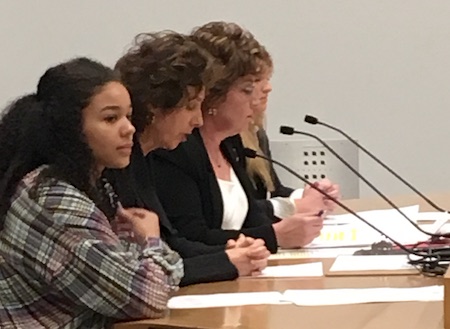Should Academic Balance Be Required in Public Schools?
Yesterday, the Minnesota Senate’s E-12 Finance Committee held a three-hour hearing on proposed legislation to require academic balance in the public schools. The push for this legislation arises out of the Center’s exposure of political indoctrination and bullying in the Edina school system. American Experiment’s Katherine Kersten testified in favor of the legislation, along with students from Edina High School.

What would the proposed legislation do? This is the language of the bill, SF 2487:
Section 1. [120B.25] ACADEMIC BALANCE POLICY.
Subdivision 1. Policy required. A school board must adopt a written academic balance policy that applies to pupils, teachers, administrators, and other school personnel. The policy must include reporting procedures and appropriate disciplinary actions for policy violations. The disciplinary actions must conform with collective bargaining agreements and sections 121A.41 to 121A.56. A district must conspicuously post the policy throughout each school building, provide a copy to each district employee, and include the policy in the student handbook.
Subd. 2. Policy components. The academic balance policy must, at a minimum:
(1) prohibit school employees, in their official capacity, from requiring students or other school employees to express specified social or political viewpoints for the purposes of academic credit, extracurricular participation, or as a condition of employment;
(2) require the school to provide a learning environment, curriculum, and instruction with access to a broad range of serious opinions pertaining to the subjects of study, including contemporary policy controversies. Public education courses are not for the purpose of political, ideological, religious, or antireligious indoctrination;
(3) require students to be assessed on the basis of reasoned answers and appropriate knowledge of the subjects and disciplines studied and prohibit discrimination on the basis of political, ideological, or religious beliefs; and
(4) require caution from classroom teachers when expressing personal views in the classroom and prohibit the introduction of controversial matters without a relationship to the subject taught, especially matters in which the classroom teacher does not have special competence or training.
The Star Tribune’ Miguel Otárola reported on the hearing. His article begins:
Recent controversy within the Edina School District was the subject of extended testimony during a Senate hearing on a bill aiming to limit political expression in state schools.
Actually, the bill aims to prevent one-sided political expression and bullying of students as has been thoroughly documented in the Edina schools.
An article published in a conservative magazine alleging “indoctrination and persecution” in the district was sent to all Edina households last year. Although many parents and school board members dismissed the piece for providing little context and cherry-picking data, some said it shined a light on political favoritism by teachers and students at schools.
Got that? “Many” dismissed the Center’s article, while “some” said it shined a light. Not hard to guess whose side the reporter is on. And what, exactly, is the “context” in which political bullying of students, teachers and staff is acceptable?
Disparaging comments made by some members of the Edina Young Conservatives Club following a Veterans Day assembly at the high school further heightened tensions in the district.
More bias. On the Strib’s telling, it was the Young Conservatives who made “disparaging comments”–apparently for no reason at all–and thereby “heightened tensions in the district.” Readers who rely on the Star Tribune will have no idea what the controversy was actually about.
Will the legislation requiring “academic balance” pass the Senate this session? Will the House take up similar legislation? And if it passes, will Governor Dayton sign it? Stay tuned.
